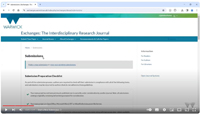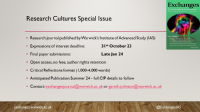New Episode Tackles ChatGPT, Reviewers from Hell & Linguistic Challenges
Writing about web page https://spotifyanchor-web.app.link/e/WxxCEwd4kFb
Two new podcast episodes in one week – it’s almost like it’s Christmas
 Podcasts are like buses – none for ages and then two come along at once. Which is why I am pleased to announce we have another episode to share with you this week, following the one with Jean Marshall. This time, and continuing our 10th birthday issue celebrations, I chatted with senior librarian and former biology Beth Montague-Hellen (Library and Information Services, Francis Crick Institute).
Podcasts are like buses – none for ages and then two come along at once. Which is why I am pleased to announce we have another episode to share with you this week, following the one with Jean Marshall. This time, and continuing our 10th birthday issue celebrations, I chatted with senior librarian and former biology Beth Montague-Hellen (Library and Information Services, Francis Crick Institute).
Listen in to the episode here:
https://spotifyanchor-web.app.link/e/WxxCEwd4kFb
As always on the Exchanges Discourse podcast we talked about Beth’s recent paper and ongoing work, as a practitioner and former biological researcher. We started by discussing her article, Placing ChatGPT in the Context of Disruptive Technology in Academic Publishing which led to a very healthy debate around the pros and cons of generative AI in publishing, but also the power they have to assist in coding. Interestingly we moved on to discuss Beth’s experiences both as a researching library practitioner and within the biological fields, which seemed to be considerably different, especially from the peer-reviewer practices. We especially touched on the emotional affect and impact which overtly harsh reviewers can engender – especially on researchers early in their career.
Our conversation moves on to talk about the difficulties some authors have when publishing in Anglosphere journals, when their first language is not English. Noting again, the less than helpful comments some face from reviewers. We closed off our chat by exploring Beth’s considered publication advice to scholars working on their earliest articles.
Episode Index
- 0:00 Opening
- 0:50 Introductions
- 2:24 Discussing Beth’s Paper
- 11:31 Coding, Statistics & AI Accuracy
- 13:34 Reviewer Experiences
- 19:19 Publishing in the Anglosphere
- 21:44 Publications in Progress
- 23:48 Advice to Authors
- 26:30 Closing & Outro
You can of course catch up with ALL of our past episodes on Spotify, or through our handy episode index.
https://exchanges.warwick.ac.uk/index.php/exchanges/podcast
Next week – another episode…and maybe even a fourth one to round out 2023 as part of our final big announcement of a busy, busy year for the journal.
 Gareth Johnson
Gareth Johnson

 Please wait - comments are loading
Please wait - comments are loading





 Loading…
Loading…

